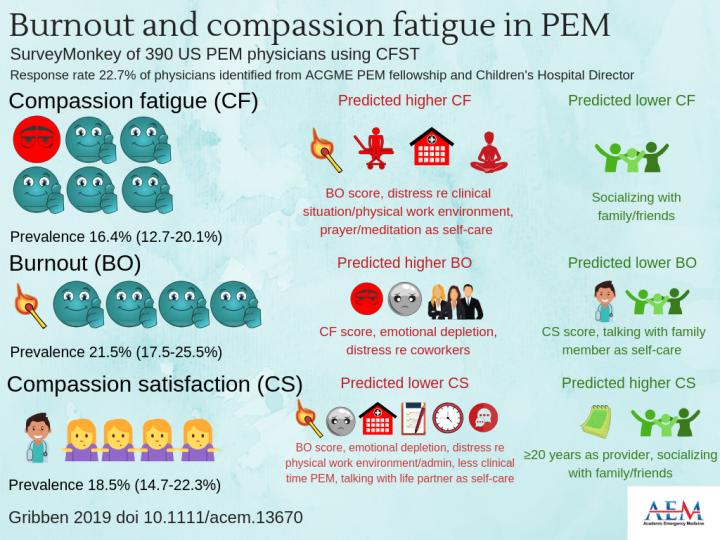
Credit: KIRSTY CHALLEN, B.SC., MBCHB, MRES, PH.D., LANCASHIRE TEACHING HOSPITALS, UNITED KINGDOM
DES PLAINES, IL — Pediatric emergency medicine (PEM) physicians are at risk for developing compassion fatigue (CF), burnout (BO), and low compassion satisfaction (CS), but proactive awareness of these phenomena and their predictors may allow providers to better manage the unique challenges and emotional stressors of the pediatric ED to enhance personal well-being and professional performance. That is the conclusion of a study to be published in the July 2019 issue of Academic Emergency Medicine (AEM), a journal of the Society for Academic Emergency Medicine (SAEM).
The lead author of the study is Jeanie L. Gribben, an MD candidate in the Division of Newborn Medicine and Department of Pediatrics, Kravis Children’s Hospital, Mount Sinai Medical Center and Icahn School of Medicine at Mount Sinai, New York, NY
The findings of the study are discussed in a recent AEM podcast, “A Cross?sectional Analysis of Compassion Fatigue, Burnout, and Compassion Satisfaction in Pediatric Emergency Medicine Physicians in the United States.”
Gribben et al. suggest that while CO, BO, and CS are distinct phenomena, there are degrees of overlap among their predictive factors that may be ripe for intervention. At the individual level, they suggest the key to provider well-being are positive interpersonal relationships, including therapeutic discussion with loved ones and compassionate connections with coworkers. At the institutional level, the authors recommend providing outlets for coping with difficult clinical situations. They also suggest that optimization of the physical work environment and administrative requirements may similarly improve health across all domains. Additionally, promoting self?care at both the personal and professional levels is essential to augment CS and protect against CF and BO in order to sustain emotional well?being throughout one’s career.
Commenting on the study is Nathan Kuppermann, MD, MPH, a distinguished professor in the Departments of Emergency Medicine and Pediatrics and the Bo Tomas Brofeldt Endowed Chair in the Department of Emergency Medicine at the University of California, Davis School of Medicine:
“Burnout (BO) is highly prevalent among general emergency physicians; however, BO (and related compassion fatigue [CF] and compassion satisfaction [CS]) have not been studied comprehensively in groups of pediatric emergency physicians. In this study, although limited in sample size, and greatly focused on Caucasian women physicians in academic centers, BO, CF and CS were present in between 16-22 percent of respondents. The study analyses highlight the importance of interpersonal relationships, both with loved ones and coworkers, organization of the physical work environment, and mindfulness by employers of administrative burden on clinicians. For both their own well-being and for the benefit of their patients, we can no longer ignore the emotional health of clinicians.”
###
ABOUT ACADEMIC EMERGENCY MEDICINE
Academic Emergency Medicine, the monthly journal of Society for Academic Emergency Medicine, features the best in peer-reviewed, cutting-edge original research relevant to the practice and investigation of emergency care. The above study is published open access and can be downloaded by following the DOI link: https:/
ABOUT THE SOCIETY FOR ACADEMIC EMERGENCY MEDICINE
SAEM is a 501(c)(3) not-for-profit organization dedicated to the improvement of care of the acutely ill and injured patient by leading the advancement of academic emergency medicine through education and research, advocacy, and professional development. To learn more, visit saem.org.
Media Contact
Stacey Roseen
@SAEMonline
708-606-7120
Related Journal Article
http://dx.




